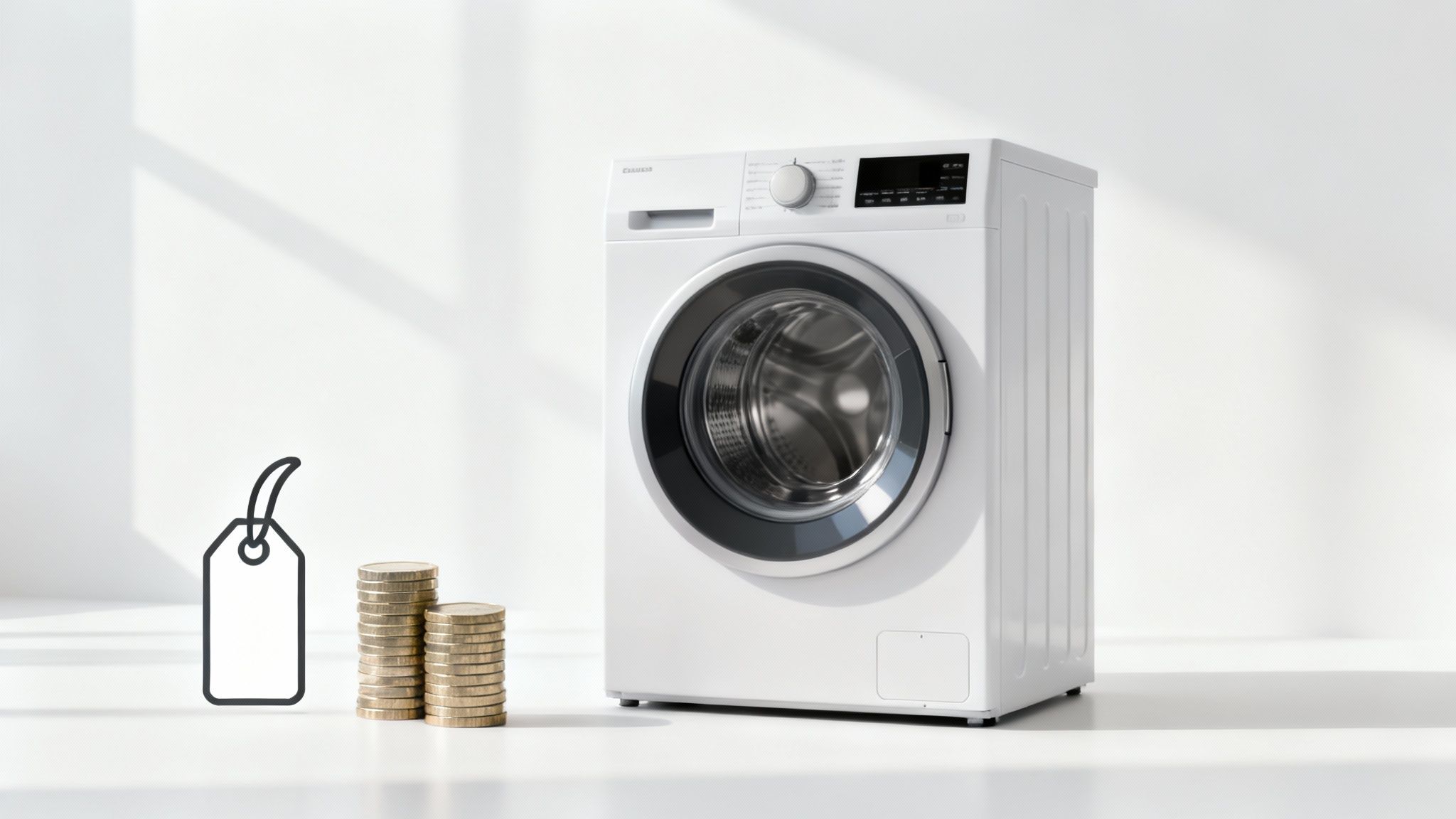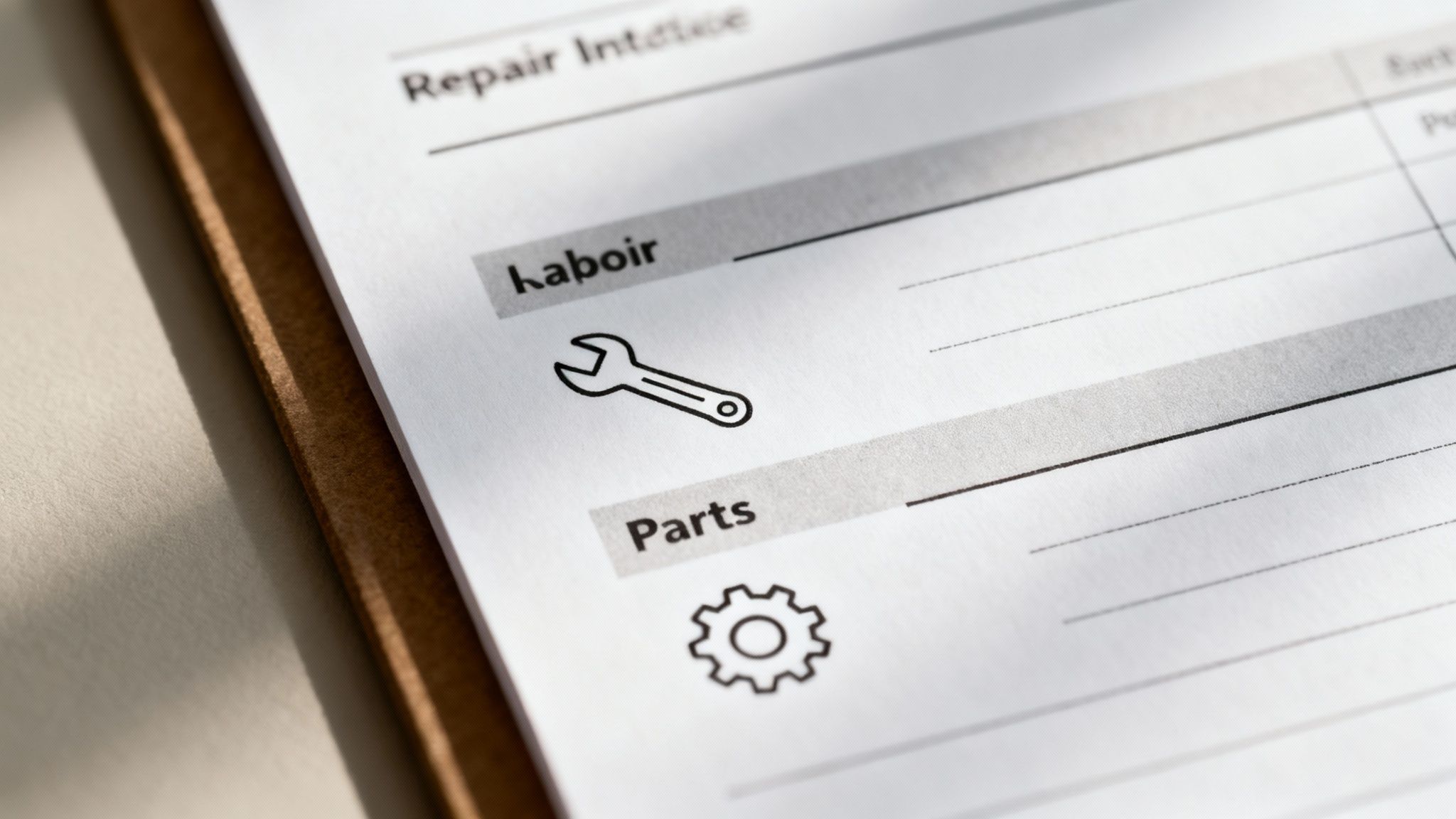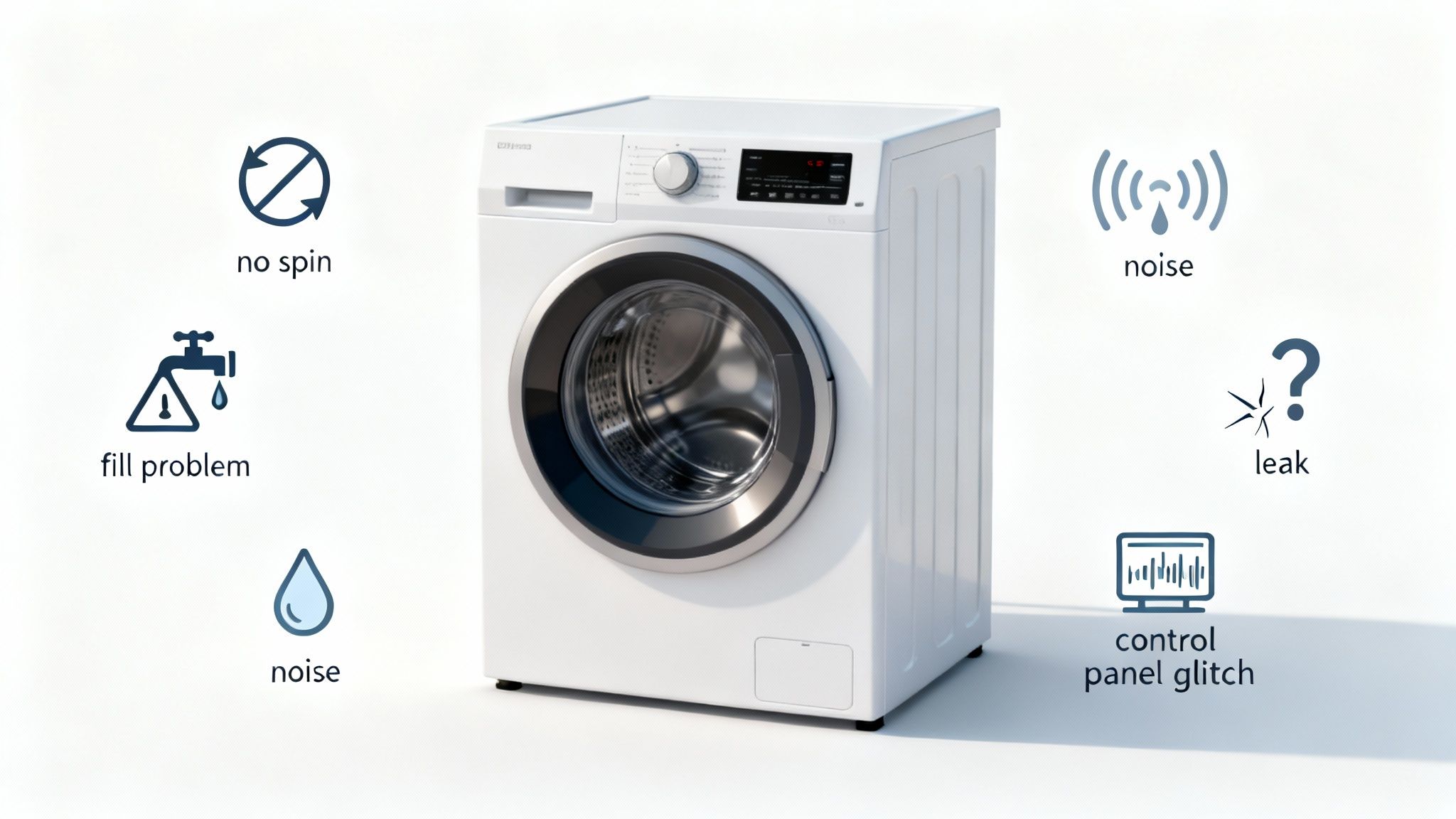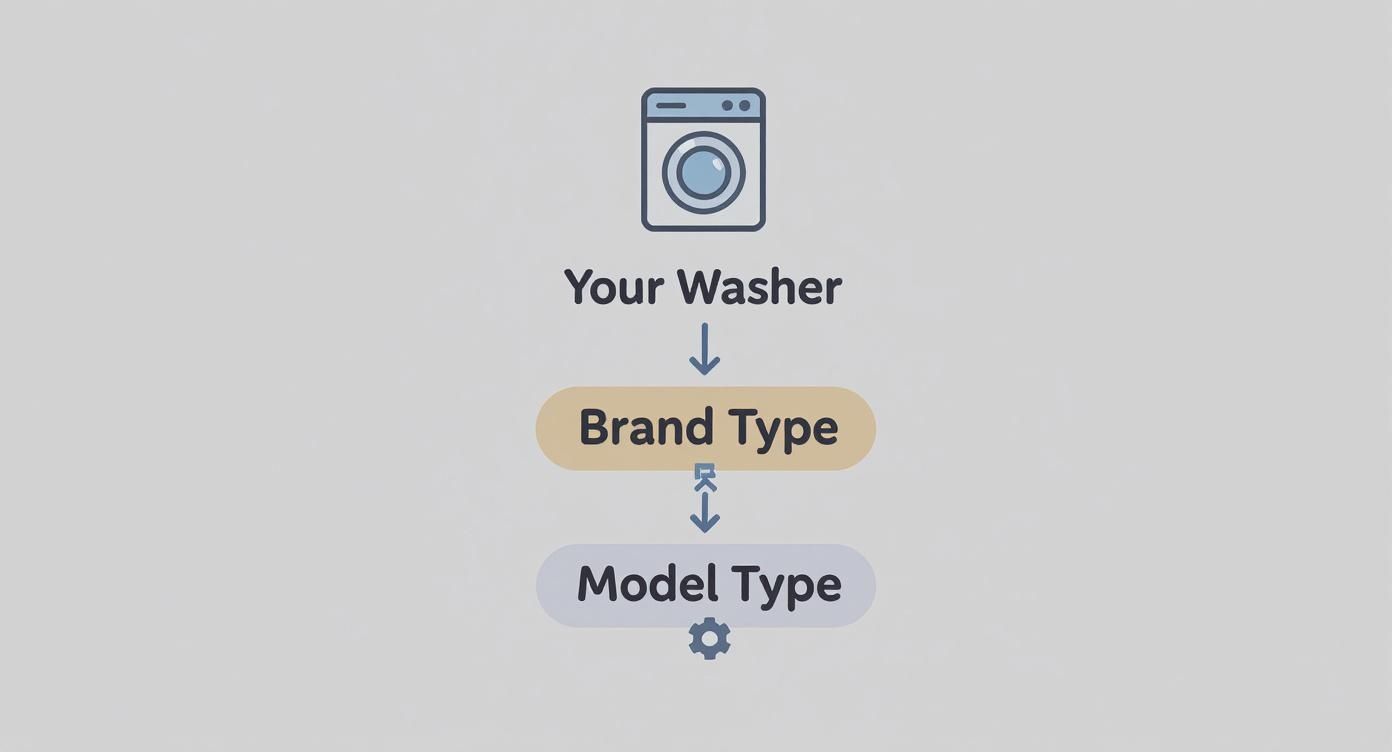When your washing machine gives up the ghost, the first question that pops into your head is usually, "Okay, how much is this going to cost me?" It's a fair question. Generally speaking, most washing machine repairs for homeowners in areas like Allen and Plano will land somewhere between $150 and $400.
Of course, that's a pretty wide range. The final bill really hinges on what specific part decided to fail and how much work it takes to get to it and swap it out.
Your Guide to Washer Repair Costs in North Dallas, Plano, and Frisco

A broken washer is more than an inconvenience; it’s a full-stop disruption to your routine, whether you're in a bustling Plano household or trying to keep up with family laundry in Frisco. The unknown cost of the repair just piles on the stress. Is this a quick, cheap fix or something that’s going to break the bank? At what point is it smarter to just buy a new machine?
We put this guide together to give homeowners here in North Dallas a clear, honest look at what to expect. Let's break down the numbers so you can make a smart decision without the guesswork.
A Quick Look at Average Costs
Across the country, washer repair costs can be all over the map. But recent data shows a typical repair running anywhere from $125 to $450, with the national average hovering around $180. The type of machine you own plays a big role here—front-load models, with their complex electronics and seals, often cost a bit more to fix than their top-load counterparts. You can learn more about what influences pricing in this comprehensive guide to washing machine repair cost factors.
For those of us in McKinney, Allen, and the surrounding areas, these numbers are a solid starting point. Simple fixes, like replacing a worn-out belt or a leaky hose, are going to be on the lower end of that scale. On the other hand, a major job—think replacing the main motor or the electronic control board—will definitely push you toward the higher end.
Having a ballpark figure in mind is incredibly helpful. It sets a realistic expectation before you even pick up the phone, letting you immediately start weighing whether a repair makes sense for your budget.
To give you an even clearer picture, we've put together a table outlining the typical costs for the most common washer problems we see right here in the North Dallas area. This should help you connect your machine's symptoms to a potential price tag.
Average Washing Machine Repair Costs in the DFW Area
Here’s a quick summary of what you might expect to pay for some of the most frequent washing machine issues.
| Type of Repair | Common Parts Involved | Estimated Cost Range |
|---|---|---|
| Water Pump Replacement | Pump, Hoses, Clamps | $150 – $350 |
| Lid Switch Fix | Lid Switch Assembly | $120 – $200 |
| Drive Belt Replacement | Drive Belt, Pulleys | $140 – $250 |
| Drain Hose Repair | Drain Hose, Connectors | $100 – $180 |
| Motor or Transmission | Motor, Transmission Unit | $300 – $500+ |
As you can see, the part itself is a major factor. A simple switch is one thing; a new motor is another story entirely.
Decoding Your Repair Bill for Frisco and Celina Residents

When you get a quote for a washing machine repair, it can feel like a jumble of numbers. But it really boils down to just two core elements: the cost of the parts needed to fix it, and the labor cost for the technician's time and expertise to do the job right.
It’s a lot like taking your car to the mechanic. You pay for the new brake pads (the parts) and for the mechanic's time to install them (the labor). The final bill is simply those two things added together.
For homeowners in Frisco and Celina, understanding this simple breakdown is the first step to feeling confident about the repair process. The invoice you receive is a clear sum of the technician's work and the physical components your washer needs to get back in action.
The Initial Service Call Fee Explained
Before any work begins, the first thing you'll almost always see is a service call fee. It’s easy to think of this as just a fee for showing up, but it covers the crucial, real costs of getting a trained professional to your home in Plano or anywhere else in our North Dallas service area.
This fee isn't just a random charge. It specifically covers:
- Travel and Time: This pays for the technician's commute, gas, and vehicle wear-and-tear to reach your home.
- Initial Diagnosis: This is the big one. It covers the expert's time spent troubleshooting your machine, pinpointing the exact cause of the failure, and figuring out what’s broken.
- Providing an Estimate: The fee also includes the work it takes to create a detailed, accurate quote for the full repair, listing out the specific costs for all necessary parts and labor.
A clear, upfront service call fee is a sign you're dealing with a reputable company. It means there are no surprises. And in most cases, if you decide to go ahead with the repair, this fee gets rolled into the total labor cost, so you're not paying it twice.
Breaking Down Labor and Parts Costs in McKinney
Once the technician has figured out what’s wrong, the final quote will have those two key line items. Labor rates for an experienced appliance technician in the McKinney area typically run between $100 and $200 per hour. You're paying for their specialized training, diagnostic skills, and hands-on experience.
Parts costs, on the other hand, are all over the map. A simple fix, like a new drive belt, might only set you back $15-$30 for the part itself. A faulty lid switch could be in the $40-$75 range.
But for major components, the investment is much bigger. A failed motor can cost anywhere from $150 to over $300, and a fried electronic control board—the machine's brain—can easily be just as much. It's the cost of these parts, plus the technician's hourly rate, that gives you the final number on the bill.
Common Washer Problems and Repair Prices in Plano

Washing machine problems are never a one-size-fits-all diagnosis, and the repair costs are just as varied. A strange noise coming from your machine in Plano will have a very different price tag than a washer that refuses to drain in Frisco.
Getting a handle on the likely causes behind common symptoms is the first real step in figuring out how much to fix a washing machine. Let's walk through some of the most frequent issues we see across North Dallas, connecting the problem to its potential cause and the typical repair bill you can expect. This will give you a much clearer financial picture before you even pick up the phone.
The Washer Will Not Spin
It’s a classic problem: you open the lid to find a pile of sopping-wet clothes. When the spin cycle fails, it’s almost always one of a few usual suspects.
- Faulty Lid Switch: This is a big one for top-loaders. It’s a safety feature that stops the machine from spinning when the lid is up. If it breaks, the washer thinks the lid is always open. It's a relatively simple fix, usually running $120 to $200.
- Worn Drive Belt: Think of this like the fan belt in a car. It connects the motor to the drum, and if it snaps or just gets too worn out, the drum can't turn. A new belt will typically set you back $140 to $250.
- Motor or Transmission Failure: This is the one you hope it isn't. If the core motor or the transmission gives out, you're facing a major, and costly, repair. Expect a bill in the $300 to $500+ range.
The Drum Will Not Fill with Water
You've got the clothes in, the detergent is ready, you turn the knob… and then silence. When the drum stays bone dry, the problem almost always traces back to the water supply components.
Most often, it’s a faulty water inlet valve. This is the little gatekeeper that opens and closes to let water into the machine. When it dies, the water can't get in. Replacing it costs around $150 to $300. On the bright side, it could just be a clogged filter screen on the hose—a much faster and cheaper fix.
Leaks and Puddles on the Floor in Allen or McKinney
Nothing gets your attention faster than a puddle spreading across the laundry room floor. For homeowners from Allen to McKinney, the first job is just finding the source of the leak.
A loose or cracked drain hose is a common offender, and thankfully, it's not a bank-breaker. You're usually looking at $100 to $180 for that repair. The other likely culprit is a failed water pump, which is what pushes the dirty water out. Replacing a leaky pump can cost anywhere from $150 to $350.
Interestingly, a leak can sometimes be tied to a smelly machine caused by mold buildup. You can learn more in our guide on cleaning smelly washing machines.
Strange Noises or Malfunctioning Controls
If your washer has started making grinding, squealing, or banging sounds, it's trying to tell you something is seriously wrong. These alarming noises often point to worn-out drum bearings or a failing motor coupling. These are more involved repairs, typically falling between $200 and $400.
What if the machine is quiet but the control panel is dead or flashing strange error codes? That often means the main electronic control board is fried. This is basically the washer's brain, and replacing it is one of the more expensive jobs, costing $250 to $500 or more.
Cost Estimates for Common Washer Failures in North Dallas
To give you a clearer at-a-glance view, here’s a breakdown of common washer issues we encounter in the North Dallas area, along with their likely causes and estimated repair costs.
| Common Problem | Potential Cause | Estimated Repair Cost (Parts & Labor) |
|---|---|---|
| Won't Spin | Faulty Lid Switch or Worn Drive Belt | $120 – $250 |
| Won't Fill | Failed Water Inlet Valve | $150 – $300 |
| Leaking Water | Cracked Drain Hose or Leaky Water Pump | $100 – $350 |
| Loud Noises | Worn Drum Bearings or Motor Coupling | $200 – $400 |
| No Power / Error Codes | Fried Electronic Control Board | $250 – $500+ |
Remember, these figures are ballpark estimates. The final price can vary based on your specific washer model and the exact nature of the failure.
How Your Washer's Brand and Model Affect the Repair Bill
When it comes to washing machine repairs, not all appliances are built the same, and that reality hits home when you get the final bill. The brand name on your machine and its basic design—whether it’s a classic top-loader or a sleek front-loader—are huge factors in what you'll end up paying.
It’s a lot like fixing a car. Finding parts for a common Ford or Chevy is usually quick and relatively cheap. But if you need to fix a high-performance BMW? You can expect to pay more for specialized parts and labor. Your washing machine is no different.
Premium Brands vs. Standard Models
If you own a high-end Samsung or LG washer packed with the latest features, be prepared for a bit of sticker shock when something goes wrong. These premium brands often rely on proprietary parts and sophisticated electronics that aren't nearly as common as those for Whirlpool or Maytag.
This exclusivity drives up the cost in a couple of ways:
- Part Pricing: The components themselves are just plain more expensive to buy from the manufacturer.
- Technician Time: It can take a technician longer to track down and get the right part, which can delay the repair.
The more complex the technology inside your washing machine, the more specialized—and costly—the replacement parts will be. It's a crucial thing to keep in mind when thinking about the long-term cost of owning a premium appliance.
Top-Load vs. Front-Load Repair Costs
Beyond the brand, the very style of your washer plays a massive role. The age-old debate between top-loaders and front-loaders continues right into the repair process.
Generally, traditional top-load washers are simpler machines. They’ve been around forever, and their basic mechanics are time-tested and straightforward. This means parts are more universal, easier to find, and cheaper. For a seasoned technician, the repairs are usually less complicated.
Front-load machines, on the other hand, are a different beast. They’re full of complex electronics, specialized rubber door seals (often called bellows), and advanced suspension systems to handle those high-speed spins. These are often the exact parts that fail, and they cost more to replace. A torn door seal on a front-loader is a frequent repair that simply isn't an issue on a top-loader.
While a top-loader might have a simple lid switch problem, some brands have their own unique issues. For example, if you're troubleshooting a specific problem, our guide on a locked Whirlpool washer can give you some targeted tips.
Ultimately, the type of washer you own directly impacts what can break and how much it will cost to get it running again, making it a key piece of the repair cost puzzle.
The Smart Choice: Repairing vs. Replacing Your Washer
When your washing machine gives out, you're suddenly facing a big decision. Do you sink money into a repair, or is it time to bite the bullet and buy a brand new one? For homeowners in Allen and all over North Dallas, it’s a classic dilemma: balancing the immediate cost against long-term value.
There’s no magic answer, but there is a handy rule of thumb that can help cut through the confusion. It's often called the “50% rule,” and it’s a fantastic starting point for making a smart, less stressful choice.
The 50% Rule: If a repair is going to cost more than half the price of a similar new washer, it’s usually smarter to just replace the whole machine.
This guideline gives you a solid financial framework, but money isn't the only thing to think about. The age of your washer, how many times it's broken down before, and even its energy use all play a huge part in figuring out the best path forward.
Key Factors Beyond the 50% Rule
Before you schedule an expensive repair, take a step back and look at the whole picture. A machine that’s been a reliable workhorse for years might be worth saving. On the other hand, one that’s always acting up is probably just a money pit waiting for its next chance to drain your wallet.
Ask yourself these three questions:
- How old is it? Most modern washing machines are designed to last somewhere between 10 to 14 years. If your washer is getting close to that decade mark—or has already passed it—a big repair bill today could easily be followed by another one tomorrow.
- What’s its track record? Have you had a technician out to fix this machine a few times in the last couple of years? A string of breakdowns is a major red flag that key parts are starting to fail.
- Is it costing you on utilities? Newer, high-efficiency washers can make a real dent in your water and electricity bills. For those of us in fast-growing areas like Celina and McKinney, the long-term savings from a modern appliance can often make up for the upfront cost, making it a better investment than fixing an old, inefficient model.
This infographic does a great job of breaking down what really drives the cost of a washing machine repair, from the specific brand to the type of model you own.

As you can see, both the manufacturer's reputation and the machine's complexity—think a feature-packed front-loader versus a basic top-loader—are two of the biggest factors in what you'll end up paying.
The Shifting Costs of Appliances and Repairs
It’s an interesting trend, but the math behind this decision has actually changed over the years. When you adjust for inflation, the price of a new appliance has gone down. At the same time, repair costs have been creeping up, thanks to things like tariffs on imported parts and rising labor rates.
This widening gap means that buying new often looks a lot more appealing than it did a generation ago. You can find some great analysis on the rising costs of appliance repairs on Fluid.services that dives deeper into this topic.
Finding a Trusted Repair Service in North Dallas
Let’s be honest: when your washer breaks, deciding whether to fix it or replace it is only half the battle. The other half—finding someone you can trust to do the job right—is just as important. You’re inviting someone into your home, and you need to know they’re skilled, honest, and won’t hit you with a surprise bill. A bad repair can easily turn a simple fix into a much bigger problem.
This isn't getting any easier, either. The worldwide market for appliance repair is set to hit a staggering $50 billion by 2025. But here's the catch: while demand is booming, there’s a real shortage of truly skilled technicians. You can dive deeper into the appliance repair market trends to see just how crucial it is to find a qualified pro.
What to Look For in a Plano or Frisco Technician
When you start your search, resist the urge to just pick the first company that shows up in a Google search. A truly professional outfit, whether they serve Allen or McKinney, will have a few key things that set them apart and prove they’re the real deal.
Here’s a quick checklist of what to confirm before you even think about scheduling a visit:
- Certifications and Insurance: Are they actually certified to work on your specific brand of washer? Just as crucial, do they carry full liability insurance? This is non-negotiable—it protects you and your home from any potential mishaps.
- Clear Service Fees: A good company is always transparent about their service call fee. They should be able to tell you exactly what that fee covers before they show up at your door. No guesswork.
- Warranties on Work: Always, always ask about the warranty. A technician who stands behind their work will offer a solid guarantee on both the parts they use and the labor they perform.
Think of that first phone call as your interview. A true professional will gladly answer your questions about their experience, warranty policies, and scheduling without making you feel pressured.
Taking a few extra minutes to find the right local expert doesn't just get your machine fixed properly; it buys you peace of mind. For more on finding local pros, you can check out our resources specifically for washer repair in Plano.
Your Top Washer Repair Questions, Answered
When your washing machine breaks down, a dozen questions probably pop into your head. How much will this cost? Is it even worth fixing? Let's tackle some of the most common questions we hear from homeowners in the Plano and Allen area to give you some clarity.
Is It Worth Fixing a 10-Year-Old Washing Machine?
This is the big one, and the honest answer is: probably not, especially if it's a major repair. Most washers are built to last about 10-14 years. Once you hit that decade mark, you're entering the territory where one broken part is often just a sign of more to come.
If it's a simple, cheap fix—say, under $150—it might be worth doing to squeeze a little more life out of it. But if the repair quote is more than 50% of what a new, comparable machine would cost, it’s almost always smarter to invest in a replacement. You'll not only get a new warranty but also likely save on your utility bills with a more energy-efficient model.
When you're trying to figure out how much to fix a washing machine, its age is one of the most important factors. A major repair on an older machine is often just throwing good money after bad.
What's the Most Expensive Part on a Washing Machine?
The big-ticket items are definitely the motor, the transmission, and the main electronic control board. These are the heart and brains of the machine, and replacing them is a major job. Expect a bill of $300-$500, sometimes even more, once you factor in labor.
When one of these core components fails, it's a real crossroads moment. For homeowners in Frisco and McKinney, this is usually the point where we have a serious conversation about the long-term value of repairing versus replacing.
How Do I Know if My Washer Motor Is Bad?
You don't have to be a technician to spot some of the tell-tale signs of a failing motor. Keep an ear and a nose out for these clues:
- The machine hums or buzzes loudly but the drum won't spin or agitate.
- You notice a distinct burning smell, like hot metal or electrical wires, during a cycle.
- The drum feels loose and spins freely when you turn it by hand, but it won't move on its own power.
Of course, these symptoms can sometimes point to other issues, but they are strong indicators of motor trouble. The only way to know for sure is to have a professional take a look.
When you need a clear diagnosis and an honest, upfront repair estimate in Allen, Plano, or the surrounding North Dallas area, trust the experts. ThumbUp.Pro offers same- or next-day appointments to get your laundry routine back on track. Book your repair online and save $20!

